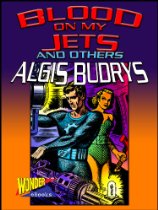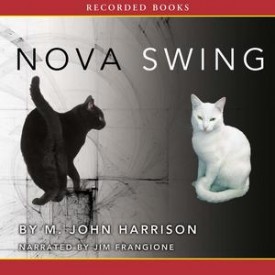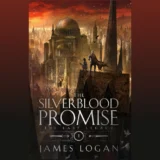Back in the old days you could read a novel in a series and pretty much enjoy that one novel as a stand-alone. The Asimov’s Foundation novels work this way, so do the novels in James Blish’s Cities in Flight. Both E.E. “Doc” Smith’s Lensmen and his Skylark series work as stand-alones. In fact, when I read those way back in the Neolithic era (in high school) I read them in a scattershot manner, jumping from one to the other, in no particular order.
There are dozens of books like this–books in a series of a “universe” that stand alone. Lois Bujold’s Vorkosigan books can each be read as stand-alone adventures. So, too, Gene Wolfe’s Book of the New Sun series and Kim Stanley Robinson’s Mars books can be read as stand-alones as well. A. Bertram Chandler’s Commander Grimes’ novels, now being reissued by Baen Books are terrific as well as the old (as yet unresurrected) E.C. Tubb Dumarest books. The fun part is that you don’t have to read them all. I’m sure you can think of another two dozen authors who have written novels-in-series that work both as a series and as a collection of stand-alone books.
Books in series are, of course, fan favorites. They allow us to return to a world we’d we had a lot of fun in the first time we were exposed to it. My favorite series of all time is Philip Jose Farmer’s Riverworld series. (Which, sadly, doesn’t work a sa series.) Farmer, as most of you know, created Riverworld out of a single 100,000 word book called You Owe for the Flesh in 1954 that won a contest, a contest that set him back a decade as a writer (he lost the money and had to work for a living). When he rethought the book, it turned into a series. The first two novels work wonderfully: To Your Scattered Bodies Go and The Fabulous Riverboat. The rest suck. Mostly Farmer fell victim to fan input (bless his heart). Other authors wreck their series out of simple greed.
There is nothing in Speaker for the Dead by Orson Scott Card that has anything to do with Ender, but Card and his publisher saw gold in them thar hills and it was suggested that he put Ender in and we all know how ununified that series became because of it (though it’s made Card millions, so I guess the strategy worked). The real fact of the matter is that authors in the science fiction field write their series merely for the money. There is no other reason, certainly on aesthetic reason: No story written toady in the sf field is so “grand”, so “uncontainable”, so bursting at the seams with ideas and significance that it can’t be put into a single novel. If that were true, why would Tolstoy write War and Peace as a single novel? If that were true, why is The Great Gatsby so short? There are more ideas in a single Faulkner novel than in all of Orson Scott Card’s canon. There is more real and lasting significance in Thomas Pynchon’s Mason and Dixon than in any Robert Sawyer series. If these things were not true, then there would be Gatsby: The Early Years or Gatsby: The Return. Or Gatsby: The Missing Diaries.
Of course in science fiction we can do things such as place our novels in stories in a “universe”. (Thomas Hardy does this in his so-called Wessex novels.) Edgar Rice Burroughs was the first to do this with his John Carter novels, his Pellucidar series, and his Caspak Trilogy. Robert Heinlein later did this (on the advice of John W. Campbell, Jr.) with his “Future History” novels and stories. Ben Bova currently is doing this in his Grand Tour books, of which my favorites are Venus, Jupiter, and Mercury.
Yes, there is lots of money to be made by writing in series.
However.
(You knew that there was a shoe about to drop, didn’t you?)
However, something is rotten in the state of Denmark. Quite a number of novels coming out these days that are supposedly within a series aren’t even stand-alone novels. Many new books end inconclusively and this is a trend that I find quite disturbing. Alastair Reynold’s Revelation Space novels as well as Kevin Anderson’s Seven Suns series and Robert Charles Wilson’s Spin-Vortex-Axis novels are among the books-in-series that have significant technical problems. In fact, I’ve just finished reading Count to a Trillion by John C. Wright, which I would add to that list as well as Kevin Anderson’s and James Herbert’s Hellhole (each are first novels in a projected series) and none of them are complete, none are stand-alone novels.
Not only is this annoying, it’s cheating, it’s disrespectful and it’s quite intentional.
Many writers are now leaving so many loose-ends that each book absolutely requires the reader to purchase the next book in the series in order to tie things together. This is part sloppy writing, but they’re also doing this very much on purpose. I enjoyed the Wright book. Several plot elements in Count to a Trillion do get resolved. The Anderson/Herbert book, Hellhole, however, just drops off. Its ending poses as a cliff-hanger, but all I said was, “Huh?” I got the distinct impression that the authors just stopped writing that particular book and moved on to the next book in the series, letting the publisher run with the first book in order to get it out on time (as per their contract and their deadlines). Robert Charles Wilson’s novel, Spin, is a masterpiece and really didn’t require a sequel or ever a third book to make it a trilogy. The middle book, Vortex, is flaccid and indecisive. It begins with totally new characters and leaves absolutely nothing resolved in the end. The last book in that trilogy, Axis, is not only badly written and also profoundly indecisive at the end, its last thirty pages were a hurry-up mish-mash of plot elements that suggested (to me, at least) that there might even have been a fourth novel only that Wilson wanted to end it there.
Are writers getting lazy in doing this? Or are readers become so Pavlovian now in their buying habits that they’ll purchase anything by an author whether or not it’s complete? I’m sure that publishers don’t care: they’re making millions off those of us who’ll read anything by our favorite authors. This is an on-going trend and it’s happening in fantasy as well as science fiction series.
It’s a trend that I don’t like. It’s a trend that doesn’t serve the field.
Indeed, deep down I don’t much like the series as a general concept. When I was growing up and reading SF (and learning how to write it), I modeled my novel-writing behavior on Philip K. Dick’s novels. Dick did not write any book in a series and he never let a novel be published that was inconclusive. I wouldn’t have minded a series from him. One, maybe. Nonetheless, I’ve always thought that a series should be something precious, a gathering of books that stands out in a writer’s canon. Nowadays, the series is the canon. Asimov even tried to merge his Foundation and Robot novels (and stories) into one universe before he died. That’s how much the thinking of the 1980s affected him at the time, because this was when publishing-in-series really started to take off.
It’s a bad trend to write inconclusive novels. True, it will spur some readers to keep reading, but it will turn others off (such as myself). My real fear is that young writers who read nothing but novels-in-series might not learn how to write a novel that has a single dramatic arc that leads to a satisfying conclusion. (Imagine Beethoven’s Ninth Symphony without the last movement? Imagine Picasso’s Guernica only partially sketched in?)
On the other hand, if we become a Pavlovian horde who’ll buy anything, then it really doesn’t matter how novels are written in the future and we deserve what we get. I, for one, won’t tolerate it and let the readers’ comments at amazon.com be my guide because they really don’t like it. They’re our canaries in the science fiction coal mine and when they get pissed off, they say so. And from what I can tell, they hate these novels that end inconclusively.
Well, to that I say: ditto.
–Paul Cook











Great article, Paul. Personally I'm waiting for Gatsby Unchained. But you know this trend isn't just in books. Television series now have continuing plot lines that leave viewers confused unless they watch week after week. There are very few series that have stand alone episodes. It's a devious plot by publishers and TV execs to hook us so we'll keep shelling out dough for successive books in the series, and keep watching the shows until our brains have been totally conditioned by the advertisers.